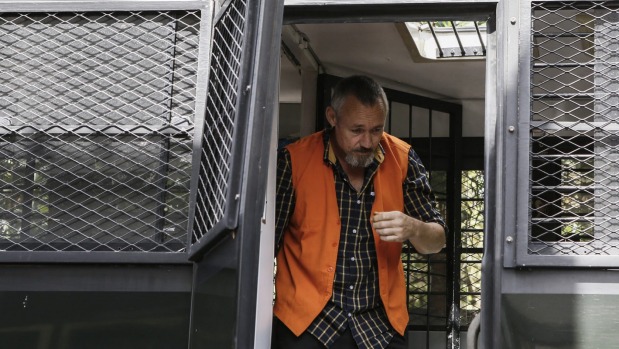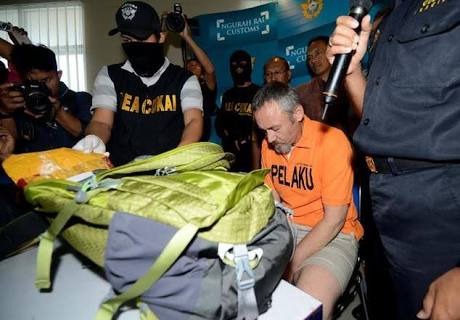You only have to spend a few minutes with Tony de Malmanche to realize he has led a sheltered life, but in a jail full of extraordinary stories his is one of the most bizarre.
It also doesn’t take long for you to get the feeling that perhaps there is more to his case than meets the eye.
In short, Tony is serving a 15-year sentence for drug trafficking, having been arrested at Bali’s airport with 1.5 kgs of crystal meth hidden in a rucksack he was carrying from Gauangzhou, China, to Indonesia.
It was the now 56-year-old New Zealander’s first trip abroad — he’d never previously even crossed the Tasman to Australia — and he strongly proclaimed his innocence, insisting he’d been set up.
Tony, from Whanganui on north island, was considered below normal IQ and had left school early, spending his life doing a variety of manual labour jobs and claiming welfare benefits.
A failed marriage had produced two sons and he’d had a couple of brushes with the law — for driving under the influence and possession of marijuana — but nothing that earned him time in jail.
He spent the last 10 years living in a caravan on a friend’s plot. He had a long history of mental illness, but had tried to better himself and help others by doing courses on mental health nursing, and occasionally putting in hours as a volunteer at a shelter.
Odd job work and benefits gave him just enough to live on, to buy a bag of tobacco and ounce of weed and treat himself to a few tins of beer once a week.
And then he fell in love.
Three years ago, out of the blue, he was contacted on Facebook by a woman named Jessie Smith who said she liked his profile picture.
She was everything that Tony wasn’t — smart, well travelled, sophisticated and rich.
 They began spending hours chatting online via Messenger and WhatApp. She sent him pictures — a statuesque South African blonde in her early forties, posing in a swimsuit by the beach, eating dinner in an expensive restaurant, skiing in Europe.
They began spending hours chatting online via Messenger and WhatApp. She sent him pictures — a statuesque South African blonde in her early forties, posing in a swimsuit by the beach, eating dinner in an expensive restaurant, skiing in Europe.
She told him of the import-export business she ran from China and how she travelled the world. She told him that despite her looks, her intelligence, her wealth and success, she was lonely. And so was he.
She told him she had fallen in love with him.
“She was on the road a lot in different time zones, so she would send messages and I would reply when I woke up,” he says.
“Sometimes we would be awake together and spend hours just talking.”
And what did she sound like?
“Oh, we never actually spoke … we just wrote messages,” he says. “Of course it sounds crazy now, but there was always something that stopped us from speaking. Her microphone didn’t work, or she was having problems with her phone…”.
I’m sure everyone reading this has, more than once, been approached on the Internet and immediately realized someone is trying to scam them. That Nigerian oil ministry employee with $500 million that needs shifting, the Arab prince with $75 million in ill-gotten oil revenue.
Tony’s scammers weren’t after $1,000 in “processing fees”, however, they were playing a long con — and they knew that had a good fish on the line.
In 2015, 18 months after they had met online, Jessie said she wanted to take the relationship to the next level. She invited him to Guangzhou, saying she would pay his airfare and hotel so they could finally meet face-to-face.
“I couldn’t wait to meet her,” Tony says. “I could see us spending the rest of our lives together. We got on so well and she really seemed to understand me.”
Tony applied for his first passport in January 2015 and had a ticket in hand to go to China, but Jessie cancelled at the last minute, saying she had been called away on an urgent business trip.
A few months later, it was back on.
When Tony arrived in China he was surprised to be met by three burly Nigerians who introduced themselves as Jessie’s employees.
She had been called away again on urgent business, they said, but would be back in a couple of days.
He was put up in a hotel and told to wait. Jessie communicated with him via email and WhatApp, saying she was in Bali and would be held up there for at least a week.
“Then she said: ‘I’ve got a better idea. I’ll get you a ticket to Bali and you can meet me here instead. It will be much more fun than China’.”
Jessie’s associates told Tony she’d given them money to take him shopping in Guangzhou so he would have the right clothes for Bali; his winter attire just wouldn’t do. His suitcase, it seemed, was also deemed unsuitable, so one of them said he’d lend him a rucksack.
The next day he was packed off to Bali and looking forward to a tropical destination he’d only dreamed of visiting, and finally meeting the love of his life.
You know how it ends.
 On arrival in Bali, customs officials pulled him aside and immediately found a secret panel containing the drugs.
On arrival in Bali, customs officials pulled him aside and immediately found a secret panel containing the drugs.
Tony maintains his complete innocence and says he never once suspected he was being taken for a terrible ride.
At his trial, his lawyers produced 450 pages of internet chat between the “lovers” carried out over 18 months in an attempt to show how Tony had been scammed.
None of it washed with the courts. Although he faced the death penalty or life in prison, prosecutors recommended 18 years and he was eventually given 15.
“Don’t believe his story,” says Austin, a Nigerian trafficker in Kerobokan who has masterminded a few scams of his own.
“I think maybe he had no idea when he arrived in China, but I think he knew what he was doing by the time he left. They would have offered him money and a holiday. It would have been very tempting for someone like him.”
Austin reckons Tony was sent over as a sacrificial lamb who had no chance of escape.
“The big syndicates will sacrifice someone every now and then so that the customs people look like they are doing their job,” he says. “Tony never had a chance, but he knew what he was doing.”
His case garnered enormous sympathy in New Zealand and a public fundraiser is what enabled him to “negotiate” his sentence down to the minimum 15 years.
Even government ministers got involved, asking the Indonesians to consider him a victim of human trafficking. The media portrayed him as an innocent dupe, a simpleton who was taken advantage of.
A lot of that sympathy evaporated a year later when Tony was one of four inmates in the foreign block given a random urine test, and he proved positive for cannabis.
Tony was targeted because in a series of paid interviews with New Zealand magazines he’d painted the prison and legal system in an unflattering light. He’d portrayed himself as clean-living and sober behind bars, but in reality was smoking daily and drinking.
The funds and goodwill have dried up from New Zealand, and Tony is now resigned to serving his sentence. He helps out at the prison clinic and has been given responsibility for tracking down the psych patients who don’t show up for scheduled appointments.
He is lucky to have been “adopted” by an industrious Italian inmate who makes sure he gets enough to eat in exchange for doing chores around the block, and keeps an eye on him when the black dog barks.
His health isn’t great and he wears his arm permanently in a sling as a result of a detached rotator cuff that would cost too much for him to afford to get fixed.
“I’m taking lots of pills for my depression, but I just have to live with it,” he says.
“But every morning I wake up and wonder how the fuck I got here. Life really sucks.”

Super stuff as always, Foxy. Counting down with you to the big day!!
I feel like I am cutting onions.
A friend of mine made documentary about Tony. It didn’t present any conclusions about his guilt or innocence, telling the story much as you have here. Sad stuff.
A cautionary tale for all, especially the lonely. I know a widowed man of considerable means who fell in love with the photo of “his online darling” from Nigeria. He sent more than 100 thousand Aus dollars to “her” with every tale of need and woe- of which there were many. He was warned by all that it was a scam but he did not believe anyone but his beloved. In the end his son got the Police to show him the trail of money which was going on a long route back to someone living in Australia!